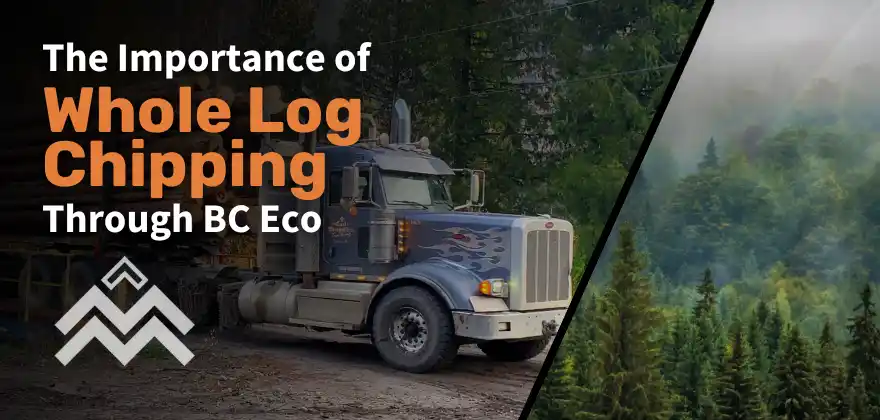In the vast landscapes of British Columbia, Canada, sustainable forestry practices play a crucial role in maintaining the ecological balance and preserving the rich natural resources of the region. Among the many innovative techniques employed by forestry consulting firms and professionals, whole log chipping has emerged as a fundamental process that ensures the responsible utilization of timber resources.
Promoting Efficient Resource Utilization
Wood chipping involves the conversion of entire logs into wood chips, making it a highly efficient process for timber utilization. Traditionally, smaller or less valuable timber was left unused or discarded, resulting in significant waste. However, with whole log chipping, BC Eco Industrial Services can utilize these logs effectively, reducing fiber waste and maximizing the value obtained from each tree harvested. This practice not only optimizes the use of forest resources but also minimizes the need for additional logging, thereby reducing the overall ecological impact.
Enhancing Forest Fire Mitigation Efforts
Forests are prone to wildfires, and the threat they pose to communities and ecosystems is a significant concern in BC. Whole log chipping contributes to forest fire mitigation by removing residual material from harvested sites. These wood chips can be used for various purposes, including biomass energy production and as a biofuel source. By utilizing the wood chips, the risk of potential fuel for forest fires is mitigated, ultimately protecting the forest ecosystem and reducing the impact of wildfires.
Supporting Sustainable Timber Harvesting
Sustainable forestry practices strive to strike a balance between economic viability and environmental stewardship. Whole log chipping aligns perfectly with this objective by enabling the sustainable harvesting of timber. The process ensures that all parts of the tree, including branches and tops, are utilized, leaving behind minimal waste. This approach not only reduces the need for additional timber extraction but also minimizes the impact on forest ecosystems. By embracing whole log chipping, BC’s forestry industry can thrive while preserving the natural heritage for future generations.
Fostering Local Economic Growth
The sustainable use of forest resources through whole log chipping has positive ripple effects on local communities and economies. By efficiently processing timber, chipping companies create a steady supply of wood chips that can be utilized in various industries, such as pulp and paper, bioenergy, and wood products.
The practices listed above contribute to the development of a robust and diversified forestry sector, supporting jobs and fostering economic growth in rural areas. Furthermore, by reducing waste and improving resource utilization, whole log chipping helps optimize production costs, making BC’s forestry industry more competitive in the global market.
Preserving Ecological Integrity
Forestry consulting firms and professionals in BC recognize the importance of maintaining the ecological integrity of forest ecosystems. Whole log chipping aids in this endeavor by minimizing the impact of forestry activities on the surrounding environment. By converting the entire log into wood chips, the process reduces the need for additional transportation, as chips can be conveniently transported to processing facilities. This leads to a reduction in carbon emissions, soil disturbance, and habitat fragmentation, thereby safeguarding the natural balance and biodiversity of the region.
As the province continues to prioritize sustainable forestry, whole log chipping remains an essential tool in ensuring a prosperous future for both the timber industry and the natural environment. By adopting and promoting these practices, BC can serve as a global leader in sustainable forestry and inspire others to follow suit.


